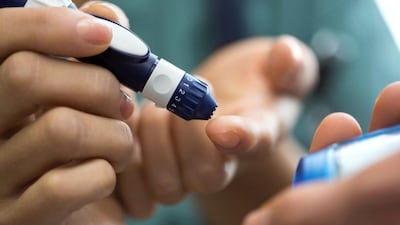Patients diagnosed with Type 1 diabetes could improve their long-term health prospects by exercising, new research suggests.
Scientists found the first few months after recognising the condition were critical to helping reduce the risk of further medical complications.
The study showed those who exercised immediately following their diagnosis could delay the onset of high blood glucose levels.
Prolonging this “honeymoon period” means the pancreas - which produces insulin to regulate blood sugar levels – is able to function normally for longer.
“Our data demonstrates exercise could play an important role for people newly diagnosed with type 1 diabetes,” said Dr Parth Narendran, of the University of Birmingham’s Institute of Immunology and Immunotherapy.
“There is now a need for clinical trials to investigate whether exercise can prolong the duration of the honeymoon period and to explore the mechanisms underlying this.”
Type 1 diabetes is a lesser understood condition compared to Type 2, which is commonly brought on by lifestyle choices including a poor diet and a lack of exercise.
Around 60 per cent of adults newly diagnosed with Type 1 are understood to experience a period where the pancreas still works efficiently, and can still produce insulin.
As time progresses, however, the pancreas can begin working less effectively and produces less insulin, meaning blood sugar levels are not controlled.
Sugar levels that are too high can cause life threatening complications such as dehydration in the short-term or organ failure long-term.
Researchers found those who exercised had a honeymoon period lasting on average five times longer - or 33 months - than those who did no exercise.
___________________
Read more:
Diabetes facility in Dubai expands to keep up with growing demand
UAE spend on diabetes care falls well short of US and UK, study shows
Artificial Intelligence helping diabetic patients keep their sight
_____________________
Just 10 per cent of those with diabetes are thought to have Type 1 and doctors remain unsure what causes the condition.
As the body fails to produce enough insulin, those affected must take daily injections or receive insulin via injections.
More is known about Type 2 diabetes, where the body either does not produce enough insulin, or the insulin produced does not work properly.
Family history, age, ethnic background and weight can all increase the risk of Type 2 diabetes, but a healthy diet and exercise can reverse the effects.
Type 1 usually affects children or young adults and can start suddenly before rapidly getting worse.
The UK study, published in Diabetic Medicine, is the first to link regular exercise to the delayed onset of Type 1 diabetes.
It could reduce the impact of associated health conditions such as sight loss, kidney failure and stroke.
In 2017, the International Diabetes Federation revealed 17.3 per cent of the UAE population aged 20-79 have Type 2 diabetes.
Although exact figures for those with Type 1 in the UAE are not available, it is thought to be somewhere between 5-10 per cent of the total diabetes population.
Dr Sarla Kumari, a diabetes specialist at Canadian Specialist Hospital in Dubai, said: “Although exercise does not delay the onset of Type 1 diabetes, once diagnosed exercise could delay the progression of the condition.
“This study shows exercise is improving how the body responds to insulin by preserving the functions of insulin producing cells in body.
“But as this study was small, there is a need for much larger studies to confirm these early results.”
Dr Yasser Sadawey, of Medeor 24x7 International Hospital in Al Ain, said diabetics who exercised could experience a drop in blood glucose during or after their workout so advised caution in those recently diagnosed with the condition to make sure they checked their blood sugar levels.


